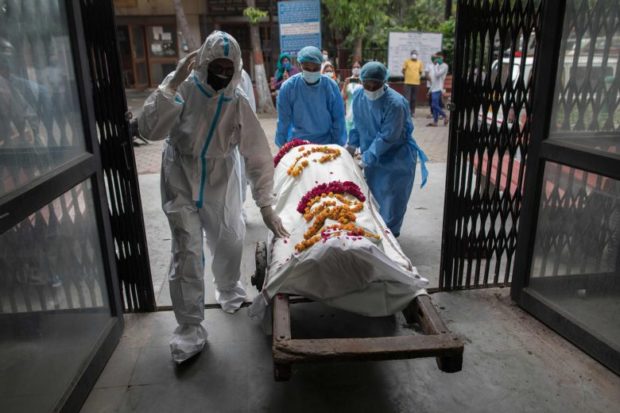Pressure on India’s healthcare system as virus hits rural areas

Healthcare workers (in blue) taking the body of a Covid-19 victim, accompanied by a relative, to the Nigambodh Ghat cremation ground in New Delhi on Saturday. As of yesterday morning, India’s official death toll stood at 56,706. AGENCE FRANCE-PRESSE via The Straits Times/Asia News Network
NEW DELHI — Coronavirus cases have been surging faster in India than anywhere else in the world for close to three weeks now, as the pandemic engulfs rural areas and ramps up pressure on the country’s shaky healthcare system.
India’s official daily total of new cases has inched closer to 70,000 for the last four consecutive days, taking its tally past the three million mark on Saturday with a single-day spike of 69,239 infections. This comes just 15 days after it crossed two million cases on Aug 7.
Yesterday morning, the official death toll stood at 56,706, after 912 deaths were added to the tally from the previous day.
There are concerns that the health infrastructure in rural areas is not equipped to handle the pandemic.
Dr T. Sundararaman, global coordinator of the People’s Health Movement, told The Straits Times that areas in the north and east are particularly vulnerable.
Article continues after this advertisement“Their ability to provide intensive care at a level that will be required is highly compromised. There has been a whole level of complacency in preparing for it,” he said.
Article continues after this advertisementThe impact of the surge in infections in India has been felt in Singapore too, which has seen 141 imported Covid-19 cases since Aug 1. Of these, 96 were travelers arriving from India.
And while India still trails behind the United States and Brazil in terms of total coronavirus infections, it could overtake them in the coming weeks as it has been reporting more cases than either of them in recent days.
India’s rise in cases comes on the back of increased testing and the infection making its way into rural areas, away from the big cities that were first impacted by the pandemic. On Aug 21, India crossed a significant milestone of testing more than one million samples in a day, taking total tests to more than 34 million.
Despite the spike in infections, the recovery rate of patients in India has improved to 74.69 per cent and the case fatality rate has dropped to 1.87 per cent, which is one of the lowest in the world. India also recorded a new high of recoveries on Saturday – at 63,631.
Covid-19 deaths worldwide, meanwhile, passed 804,000 on Saturday as cases rose to more than 23 million, according to data from Johns Hopkins University and Bloomberg.
Mexico, which has the world’s third-highest death toll, also moved past another grim milestone on Saturday with 644 additional fatalities that brought the country’s total number of deaths to 60,254. The number of cases stood at 556,216, with 6,482 new cases on Saturday.
South Korea, once praised for suppressing the pandemic, also continued to battle a new wave of infections that is now spreading beyond Seoul and Busan to its provincial areas.
The country reported 397 new virus cases yesterday, according to Yonhap news agency. This is the highest number since March 7 and marks more than a week of daily three-digit increases. It is also the first time in recent weeks that 100 cases had been reported outside of greater Seoul.
Elsewhere in Asia, Indonesia added over 2,000 new infections yesterday, bringing its total to 153,535. Its death toll from the virus remains the highest in South-east Asia at 6,680, after another 86 fatalities were reported yesterday.
In Italy, fresh daily cases went past the thousand mark, reaching this level for the first time since early May. Confirmed new cases touched 1,071 on Saturday, with many infections detected in travelers who were tested as they returned to the Italian mainland from Sardinia after holidaying.
Other countries in Europe, such as France and Germany, have also seen a similar increase in infections in recent days, which has sparked fears of a new wave.
Brazil recorded 50,032 new cases of Covid-19 on Saturday. The country has registered more than 3.5 million cases and more than 112,000 deaths. Both figures are second-highest totals, following the US. There are signs, however, that the pandemic may be plateauing in this global hot spot.
From a daily high of 69,074 on July 29, the number of daily new infections has stabilized to between 50,000 and 60,000. Any reversal of the spread of the virus in Brazil would be “a success for the world”, the World Health Organization has said.
The US, on the other hand, registered more than 45,000 new cases and 958 deaths on Saturday, taking its total to 5.69 million cases and 176,355 deaths respectively.
For more news about the novel coronavirus click here.
What you need to know about Coronavirus.
For more information on COVID-19, call the DOH Hotline: (02) 86517800 local 1149/1150.
The Inquirer Foundation supports our healthcare frontliners and is still accepting cash donations to be deposited at Banco de Oro (BDO) current account #007960018860 or donate through PayMaya using this link.